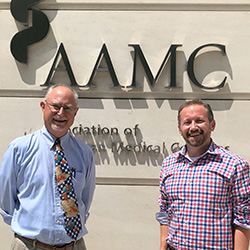Faculty Discuss Population Health at AAMC
Jeff Wolfrey, MD, professor and chair of the Department of Family, Community and Preventive Medicine at the University of Arizona College of Medicine – Phoenix, and Jason Leubner, MD, associate program director for Clinical Affairs, were recently invited to the national headquarters of the Association of American Medical Colleges (AAMC) in Washington, DC, to describe best practices in population health management at primary care residency programs.

Residency programs known as innovators in population health education for Internal Medicine, Pediatrics and Family Medicine were invited to participate. The UA College of Medicine – Phoenix Family Medicine Residency has a long and rich tradition in family medicine at Banner – University Medical Center Phoenix.
Population health management is a systematic approach to ensuring that all members of a defined population receive appropriate preventive, chronic and transitional care.
Dr. Wolfrey said effective population health management is a critical success factor for a health care delivery system and an important component of the curriculum for residents and medical students.
About the College
Founded in 2007, the University of Arizona College of Medicine – Phoenix inspires and trains exemplary physicians, scientists and leaders to advance its core missions in education, research, clinical care and service to communities across Arizona. The college’s strength lies in our collaborations and partnerships with clinical affiliates, community organizations and industry sponsors. With our primary affiliate, Banner Health, we are recognized as the premier academic medical center in Phoenix. As an anchor institution of the Phoenix Bioscience Core, the college is home to signature research programs in neurosciences, cardiopulmonary diseases, immunology, informatics and metabolism. These focus areas uniquely position us to drive biomedical research and bolster economic development in the region.
As an urban institution with strong roots in rural and tribal health, the college has graduated more than 1,000 physicians and matriculates 130 students each year. Greater than 60% of matriculating students are from Arizona and many continue training at our GME sponsored residency programs, ultimately pursuing local academic and community-based opportunities. While our traditional four-year program continues to thrive, we will launch our recently approved accelerated three-year medical student curriculum with exclusive focus on primary care. This program is designed to further enhance workforce retention needs across Arizona.
The college has embarked on our strategic plan for 2025 to 2030. Learn more.